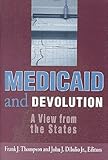Medicaid and Devolution: A View from the States
How much responsibility for providing health care to the poor should be devolved from the federal government to the states? Any answer to this critical policy question requires a careful assessment of the Medicaid program. Drawing on the insights of leading scholars and top state health care officials, this volume analyzes the policy and management implications of various options for Medicaid devolution.
Proponents of devolution typically express confidence that states can meet the challenges it will pose for them. But, as this book shows, the degree to which states have the capacity and commitment to use enhanced discretion to sustain or improve health care for the poor remains an open question. Their failure to attend to issues of politics, implementation, and management could lead to disappointment. Chapters focus on such topics as Medicaid financing, benefits and beneficiaries, long-term care, managed care, safety net providers, and the appropriate division of labor between the federal government and the states.
List Price: $ 19.95
Price: $ 18.66
Medicaid Everyone Can Count On: Public Choices for Equity and Efficiency
Health-care programs for the poor should be based on principles of equity, efficiency, and democracy. Medicaid and the State Children’s Health Insurance Program (SCHIP) fall far short of this ideal. This volume outlines an approach to reform based on equal distribution of benefits across states, efficient allocation of resources, and policy choices that reflect the interests of voters and taxpayers. Thomas W. Grannemann and Mark V. Pauly emphasize controlling and redirecting the flow of resources as the key to meaningful reform.
List Price: $ 25.00
Price: $ 24.11
Poor People’s Medicine: Medicaid and American Charity Care since 1965
Starting with a brief overview of the history of charity medical care, Jonathan Engel presents the debates surrounding Medicaid’s creation and the compromises struck to allow federal funding of the nascent programs. He traces the development of Medicaid through the decades, as various states attempted to both enlarge the programs and more finely tailor them to their intended targets. At the same time, he describes how these new programs affected existing institutions and initiatives such as public hospitals, community clinics, and private pro bono clinical efforts. Along the way, Engel recounts the many political battles waged over Medicaid, particularly in relation to larger discussions about comprehensive health care and social welfare reform. Poor People’s Medicine is an invaluable resource for understanding the evolution and present state of programs to deliver health care to America’s poor.
List Price: $ 24.95
Price: $ 18.39



